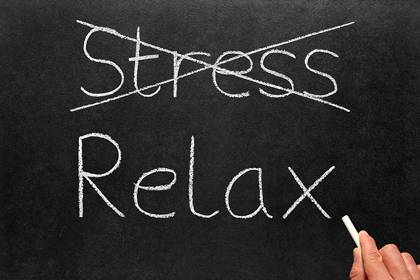Take Five: Managing Stress
Tips to slow life down when it speeds up

People deal with worries about money, work or family on a regular basis but stress doesn't need to take over our lives.
Managing stress can be as easy as taking a deep breath or going for a walk. Because stress isn't something that can just be avoided, it's easiest to tackle the issue head-on, said Dr. Jeffrey Brantley, founder and director of the Mindfulness-Based Stress Reduction Program at Duke Integrative Medicine.
Read More"We as human beings have it wired into us to have stress reactions to the demands of our life," he said. "But it's how we react - between our physical, emotional, psychological, and social behaviors - that can help us move beyond it."
Use these tips from Brantley to help manage stress in your life:
Identify your body's reaction to stress
One of the first steps to dealing with stress comes from knowing what you do or feel like when you deal with stress, Brantley said. Common symptoms of stress include faster heartbeat, higher blood pressure, tightening muscles and a general feeling of being tense.
"When you sense stress taking hold, recognize how you feel," he said. "As soon as you feel it, have a different message prepared to tell yourself to help your body restore its balance."
Brantley suggested keeping a gratitude list of five things to refer to when feeling stressed out.
Set expectations for yourself and others
When demands overwhelm us, Brantley said that's the perfect time to take a step back and prioritize by looking at the big picture to find what the root of a problem is. After that, finding a solution to calming stress can come easier.
"When we're asked to do a lot within certain timelines, our reactions can range from anger to despair," he said. "Sometimes we expect things of ourselves that are really more than anyone would expect, but if we communicate openly and honestly with ourselves and others about schedules and the reality of getting tasks done, you'd be surprised at how often compromises can be made."
Practice mindfulness
Brantley said that mindfulness, which is a practice of paying attention to bodily sensations in a non-judgmental way to bring the mind back to the present moment, is a helpful way to reduce stress. A key component is being aware of thoughts and feelings and how they're affecting you.
"When you realize you're laying a heavy burden on yourself with criticism or expectations, take a deep breath or two, take a step back and do a reality check," he said.
Don't turn to 'comfort' food
Brantley said many people like to eat when they're stressed because it makes them feel better. However, he noted it's important to ask yourself if you're hungry, or just upset. Overeating due to stress can potentially add even more stress to your life by negatively impacting health. Instead of eating, Brantley suggested activities like taking a walk, listening to soothing music or practicing some kind of meditation.
Remember to keep perspective
"Treat yourself with kindness and self-compassion," Brantley said. "Each of us deserves self-care, so when we fall into a stressful situation, don't just blame yourself and get lost in a blame game. Have gratitude for all the good things in your life."